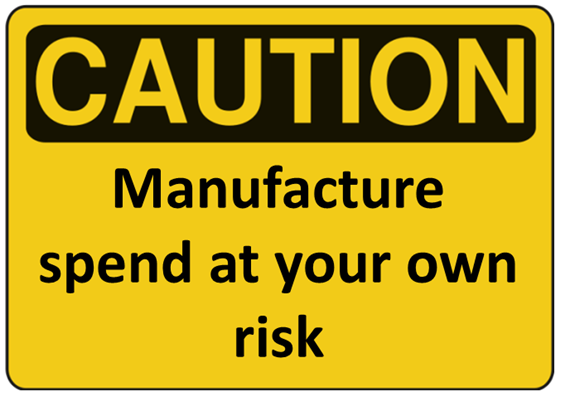I write often about techniques for manufacture spend. These are techniques designed to increase credit card spend in ways that result in getting most or all of your money back. The purpose of these techniques is to help meet minimum spend requirements, earn big spend bonuses, or to simply increase credit card rewards. While there’s nothing illegal about these techniques, sometimes they can be used for illegal purposes: fraud, theft, money laundering, etc. As a result, banks and other financial institutions watch for suspicious activity and will often shut down suspicious accounts, usually without warning. Similarly, banks that believe you to be a bad financial risk or an unprofitable customer can shut you down.

If a bank or credit card issuer shuts down one of your accounts, it will most likely shut down all of your accounts. For example, if Chase shuts down your checking account they will most likely close all of your Chase credit card accounts as well.
Almost everyday I get questions about this. People ask… what is safe? Let’s try to figure that out…
A couple of years ago I broached this subject specifically with respect to Chase accounts. I wrote: Why Chase cancels accounts (and how to protect yourself). In that post I suggested that accounts were shut down for two primary reasons: Bad credit risk, and “Perk abuse” (a term I made up for that post). Both are valid concerns today, but its necessary to add another shut down trigger: suspected money laundering.
Let’s look briefly at each…
Bad credit risk
When a credit card customer suddenly starts charging more to their card than they earn, it’s perfectly reasonable for the card issuer to worry that the cardholder won’t be able to pay them back. When this happens with American Express cards, you’re likely to receive a financial review. If that happens, your Amex accounts will be frozen until the review is done. If you pass, you’re good to go. Otherwise, you’ll need to look to other card issuers for credit cards. View from the Wing wrote up details about Amex financial reviews here. Other banks may not be kind enough to give you the chance for review. They may decide to cut their potential losses and simply shut you down without opportunity for review.
Perk abuse
Credit card companies often offer bonuses as loss leaders in order to attract new customers, retain existing customers, or to keep their card “top of wallet”. In many cases, these bonuses are “game-able”. If you game the system too much, though, you may get shut down.
One famous example was when the Chase Freedom card used to offer checking account customers an extra 10 Ultimate Rewards points per transaction. Since Ultimate Rewards points can be redeemed straight up for 1 cent per point, this meant that a one cent purchase turned into a 9 cent profit for the consumer. Of course, it wasn’t long before people figured out ways to script the purchase of 1 cent gift cards. They ran their scripts thousands of times, earned huge piles of Ultimate Rewards points, and then had their accounts shut down.
Then there are cases that many of my readers are familiar with. One example was when Citi had a signup offer for their ThankYou Preferred card in which customers would get 5 points per dollar at gas stations, groceries, and drug stores for 12 months. Needless to say, many customers spent a lot of money at those locations buying gift cards and reload cards. And, for a few weeks one May, many people had their accounts forcibly shut down.
Suspected money laundering
Some manufactured spend techniques result in cash or money orders that need to be deposited to a bank in order to pay one’s bills. In small amounts, that’s fine. In large amounts, banks are likely to suspect you of money laundering. How much is “a large amount”? Due to the Bank Secrecy Act (which requires financial institutions to assist government agencies in detecting money laundering), deposits (or transfers or withdrawals) of $10,000 or more must be reported to the government. So, it seems likely that regular deposits over $10,000 will be more closely looked at than smaller deposits.
That does not mean you should actively deposit “just under” $10,000! If you do that, your manufactured spending will suddenly become illegal after all. The reason? Structuring. It is illegal to “structure” deposits in order to evade these reports. Banks are required to report potential structuring as well. Travelblawg has a couple of in-depth posts about manufactured spend and structuring. These are worth a read:
So, what’s safe?
I don’t know. I don’t work in the banking industry. I have no inside knowledge of… anything. That said, I do get asked this question all the time. So, for those who don’t mind taking advice from someone who knows almost nothing about this subject, here are my best guesses as to what is safe:
Bad credit risk
To avoid looking like a bad credit risk, I recommend keeping credit card spend below the salary stated on your credit application. For example, if your stated salary was $60K per year, that averages to $5,000 per month. Keep your balance with that bank below $5,000 at any one time. For most people, that means spending less than $5,000 per billing cycle. Some like to pay off their credit card multiple times per billing cycle, though, so you may be able to spend more than $5,000 without raising concerns that you’re a bad credit risk. Warning: paying off your credit card many times per month may raise other red flags. I don’t know this to be true, but it seems reasonable.
Perk abuse
To avoid getting shut down due to perk abuse, many think that it’s a good idea to mix bonus spend with “regular” spend. In older posts, I’ve been known to recommend that myself. For example, I used to recommend that people use their Chase Ink cards not just for 5X bonus spend but for 1X or 2X spend as well. But… I’ve long since stopped listening to my own advice here. I have a number of credit cards with 5X categories and I use them exclusively within their bonus categories. I’ve never had any problem with that approach.
I believe that a more important safeguard is to limit the credit card issuer’s losses. If you cost them too much money, they’ll eventually notice you. How much is too much? Since we have no other information to go with (that I can think of), let’s go with the bar set by Amex recently. Their “old” Blue Cash card lets people earn 5% cash back at grocery stores (after the first $6500 spend each year). This benefit used to be uncapped, but Amex has recently imposed a $50K per year cap on that spend. In other words, they’ve limited their exposure to 5% of $50,000 or $2,500 per year, per person. Chase has the same $50K limit on 5X spend with their Ink Plus product. This leads to a few recommendations:
- For cards with great spend bonuses, limit bonus spend to $50,000 per year
- For cards with other types of “game-able” bonuses (like the Freedom example), limit the bank’s payout to you to less than $2,500 per year.
- Spread out the spend as much as possible. For example, if you plan to spend $50,000 per year, try to keep to less than $5,000 in any one month.
Suspected money laundering
The best way to avoid suspicion of money laundering is to avoid depositing cash or money orders at all. Sometimes the same techniques that are used to buy money orders can be used, instead, to pay your credit card bills. Or, rather than depositing your cash or money orders, try going into your bank and asking to pay your credit card bill with cash or money orders. If cash or money order deposits are unavoidable, I’d recommend keeping such deposits to $3,000 or less per week. My guess is that that’s low enough to avoid suspicion. No self respecting money launderer would do such low amounts, right?
Reader input
Have you had credit card accounts or bank accounts shut down due to manufacturing spend? From your experience, do you think that the above guidelines would have kept you safe? Do you have other suggestions for staying safe? Please comment below.





[…] most financial institutions will find no issue at some low volume level [the self-respecting money launderer standard {though the actual lower bar (if such a thing exists) may be smaller perhaps this value per […]
Im thinking about trying this out. I have spent the last 2 weeks researching MS. But I haven’t found one article that tells you what to do with all the open credit cards. Do you cancel after the bonus that dings your credit and you get dinged for too many open cards. So can you help out a noob?
Having a lot of open cards doesn’t in itself hurt your credit score. In some cases, it can actually help since it usually leads to a lower credit utilization ratio (which is good). It can hurt to have a short average age of credit, though. So, its a good idea to keep your oldest accounts open indefinitely.
.
In general, I wouldn’t recommend cancelling the new cards until the annual fee comes due at the end of the year. Then, consider cancelling or downgrading to a no fee card.
.
Please signup for my email newsletter to learn more: http://eepurl.com/j_M9n
I spend about 100k a year on Amazon for my business. I have a Chase Ink Plus card with a 5% bonus in office supply stores up to 50k/year. I’ve been buying Amazon gift cards from Staples for the past few months, but am concerned Chase might think I’m manufacturing spending and shut me down. Am I gaming the system in their eyes? These are all legitimate purchases, just made with a gift card courtesy of Staples and Chase Ink.
Do you mix in other spend as well or just use the Ink card to buy Amazon gift cards? My best guess is that it is safer to mix in other types of spend.
I pay off my credit card balances weekly. My FICO score continues to go up (well over 800), and I’ve heard nothing of the last couple years from Chase, AMEX, Barclays, or CapOne with regard to their not liking the weekly payments.
Thanks. That’s a helpful data point.
[…] Manufacturing spend: What’s safe? – A look at manufactured spending best practices and possible suggestions to avoid account shutdowns and other trouble. […]
[…] Frequent Miler post: Manufacturing Spend: What's safe? […]
[…] this week I published “Manufacturing spend: What’s safe?” That post focused on ways to avoid getting shut down by banks and other credit card issuers […]
Looks like the first wave of Redcard shutdown has started as reported on FT:
http://www.flyertalk.com/forum/manufactured-spending/1660498-rip-redbird-fun-while-lasted.html
I’m new to Redcard . I have just loaded $2000 the first partial month and $5000 last month. Do you think transfers back to my linked bank account of up to half the loaded total raise suspicion. Is it better to find bills to pay with the bill pay Redcard service. Is that service dependable enough to use to pay quarterly estimated Federal taxes if I send 3 weeks ahead of due date. I see many people are just paying off credit cards from bill pay. Doesn’t that raise suspicion even if you are careful not to pay off the same card or card company you recently used for the reloads? I’m hoping Redcard keeps allowing CC reloads. I plan to just use one Redcard and mostly to help meet minimum spends. Do you think Redcard will keep allowing direct CC reloads or will this probably just stop in a short time?
My assumption is that doing half through withdrawals should be fine. I wouldn’t recommend paying your taxes with this. Instead, transfer to your bank account and pay from there. No one knows if/when Target will stop accepting credit card reloads.
Will it work if one wants to buy a Kroger GC at Staples and then use it to buy a OV or VGC at Kroger?
I don’t think that Kroger will accept a kroger gift card as payment for a variable load Visa gift card
I too am curious about RedBird. You are limited to $1k per transaction and $5k per month per card. Also your receipt from Target says “cash reload”. Would 1 or 2k per week be considered structuring? At $5k per month, are they going to notice?
@Mike, Structuring only relates to structuring transactions to avoid the Bank Secrecy Act reporting requirements. If you do lots of $1k transactions because $1k is the limit on the transaction, you’re fine. It’s only if you say to yourself, “I really don’t want a CTR filed with my name, so I’ll do X,” that you’ve committed the crime of Structuring.
This is obviously highly YMMV, but I have found that the suspected money laundering issue is much more of a problem when purchasing money orders than depositing them. Many stores will refuse gift card payments outright, and my experience has been that even the friendly ones will cut you off if you buy too many too often. They are retailers, not financial institutions, they sell MO as a convenience and not to make money, and they have every incentive to cut you off the moment they think you might be a compliance risk.
On the other hand, if you deposit MOs at a smaller local bank or credit union, you can build a friendly relationship with the staff and explain to them what you are doing, and in my experience it goes a lot further than it would at a retailer that sells MO or at a big bank. At one of the big banks you will just be an entry in a database to their compliance department in another state. And they won’t really care about your deposit accounts just like the grocery store doesn’t care about losing your MO business.
I deposit all my MO at a small local credit union where I have a good relationship with the manager of my branch, with whom I have always been completely frank about my activities. I’m not sure exactly why my CU is so confident that all I’m doing is MS and wouldn’t talk about it if I did know, but I am the complete opposite of under the radar there and have been depositing large volumes of MO for almost two years now.
My “big” MS is loading my Serve account by $350 per week using my Sapphire card. I have been doing that every week for the past 3 months. Does anyone think the regularity of payments could raise an issue with Chase? Thanks.
Actually I have been told by a couple of CC’s that once a pattern is established it causes less attention from the computerized algorithms that look for fraud alerts….so now spending $1000+ at target is normal and goes through, while spending $40-$50 multiple times a day would draw more attention…and visa-versa…..if nothing is said and a pattern is established you should be good.
Do CC companies only look at their own cards when it comes to spending vs income? Or can/would they look at credit reports to see balances or spending on other cards? For example, if I make $50k/yr, spending $10k-$15k per month would be suspicious on one card, but if I’m spreading that over 3 cards, would it then not be an issue?
They do not look across other issuers unless you request new credit in which case they’ll pull your credit report.
It would be great if you could specify max spend limits in terms of CC cycle year or calendar year (ink bold etc)
I’m not sure what you mean by that. Ink Bold has $50K account year 5X limit.